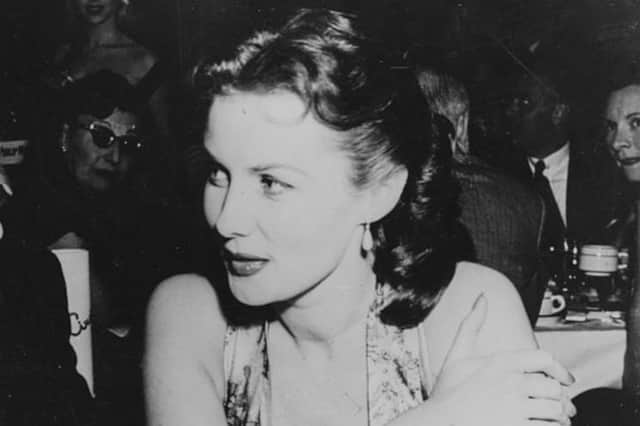Obituary: Rhonda Fleming, Hollywood's 'Queen of Technicolor'


Rhonda Fleming’s name will probably not mean much now to anyone other than keen cineastes and those over the age of 75. But there was a time when she was the “Queen of Technicolor”.
She acquired the title not because she was the most prominent actress of the post-war years, but because her pale complexion and fiery red hair showed up the qualities of the new film stock and that in itself made her popular with producers and directors.
Advertisement
Hide AdAdvertisement
Hide AdIt is slightly ironic, therefore, that she is remembered now, if at all, for 1940s Film Noirs, including supporting roles in Build My Gallows High and Alfred Hitchcock’s Spellbound.
The drama of Fleming’s life compares with anything she did on screen.
In a real-life Hollywood fairytale, her career began after she was literally approached in the street by a talent scout and transformed from a Beverley Hills High schoolgirl into one of the leading Hollywood stars of her day.
"He stopped me crossing the street,” Fleming recalled many decades later.
“It kinda scared me a little bit. I was only 16 or 17. He signed me to a seven-year contract without a screen test.”
Although her mother was an actress, who had appeared on stage with Al Jolson, Fleming never actually wanted to act. She wanted to be a singer. “It just happened,” she said.
Although she was to rack up six marriages and four divorces, she was young and innocent when she first got into movies.
When Hitchcock told her that he wanted to cast her as a nymphomaniac in Spellbound she went home and got her mum to look up "nymphomaniac” in the dictionary. “We were both shocked,” she said.
Their shock, however, did not stop her taking the part.
Advertisement
Hide AdAdvertisement
Hide AdRhonda Fleming was born in 1923 in Los Angeles, with the name Marilyn Louis. While her mother and maternal grandfather had been in showbiz, her father had the more prosaic job of insurance salesman.
Her parents divorced when she was young and her mother encouraged her to become a singer, while also sending her photo around the film studios.
After Fate, or simply good luck, took a hand in matters, talent agent Henry Willson changed her name to Rhonda Fleming and promised to make her a star.
She married for the first time in her teens, to her high school sweetheart. He went off to the Second World War and by the time he got back his new bride had different priorities and was intent on divorce and focusing on her nascent film career.
Wilson got her a contract with the legendary producer David O Selznick, who was best known for producing Gone with the Wind and Rebecca.
Fleming’s first notable big screen role came in 1945 as one of psychiatrist Ingrid Bergman’s patients in Spellbound, the thriller in which Hitchcock mixed Freud and Dali to such memorable effect.
In fairly quick succession she appeared in the thriller The Spiral Staircase with Dorothy McGuire, the western Abilene Town alongside Randolph Scott, and Out of the Past.
The latter was released in the UK as the more dramatic-sounding Build My Gallows High and is regarded as one of the key films in the Film Noir genre. Again it was a supporting role, with Jane Greer as the female lead opposite Robert Mitchum.
Advertisement
Hide AdAdvertisement
Hide AdFleming got her nickname “Queen of Technicolor” after co-starring with Bing Crosby in the musical comedy A Connecticut Yankee in King Arthur’s Court, in which she got to show off her singing ability. It was a big hit when it opened in 1949.
In later years Fleming maintained that she had hated being dubbed “Queen of Technicolor” and that she was being cast for the way she looked rather than her acting ability. She reckoned that is why so many of her films were so quickly forgotten.
In the early 1950s Fleming moved to Paramount, where she made several films with Ronald Reagan, who became a lifelong friend.
She worked solidly throughout the decade, played Cleopatra in Serpent of the Nile and was showcased in the musical Those Redheads from Seattle.
She had the lead female role in the Fritz Lang thriller While the City Sleeps, starring alongside Dana Andrews, and the western Gunfight at the OK Corral, with Burt Lancaster and Kirk Douglas.
At the same time she developed her singing career and invested successfully in property, which enabled her to announce that she was “semi-retired” at the start of the 1960s.
However, Fleming would subsequently make regular guest appearances in hit television shows, including Wagon Train, McMillan and Wife and The Love Boat. And British director Michael Winner gave her a cameo as herself in his 1976 film Won Ton Ton, the Dog Who Saved Hollywood.
A staunch Republican, Fleming was active in several campaigns, including one for compulsory school prayers.
Advertisement
Hide AdAdvertisement
Hide AdShe also put money and time into women’s health and funded a research fellowship into women’s cancers, in memory of her sister.
Fleming’s first four marriages ended in divorce. Her fifth husband was Ted Mann, the wealthy founder of the Mann Theatres cinema chain.
They each had their own luxury flat in the Century City area of Los Angeles, one on top of the other. Her last two husbands predeceased her.
She is survived by a son from her first marriage.
BRIAN PENDREIGH